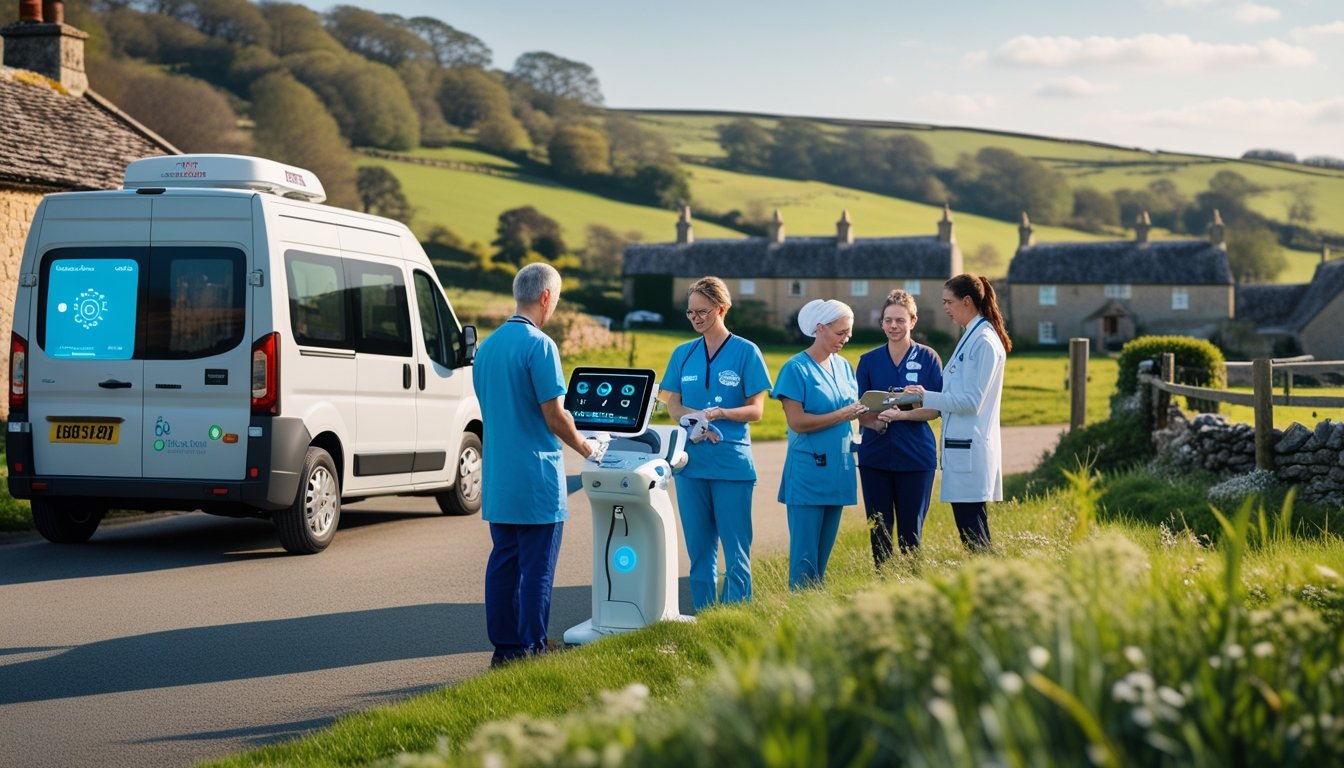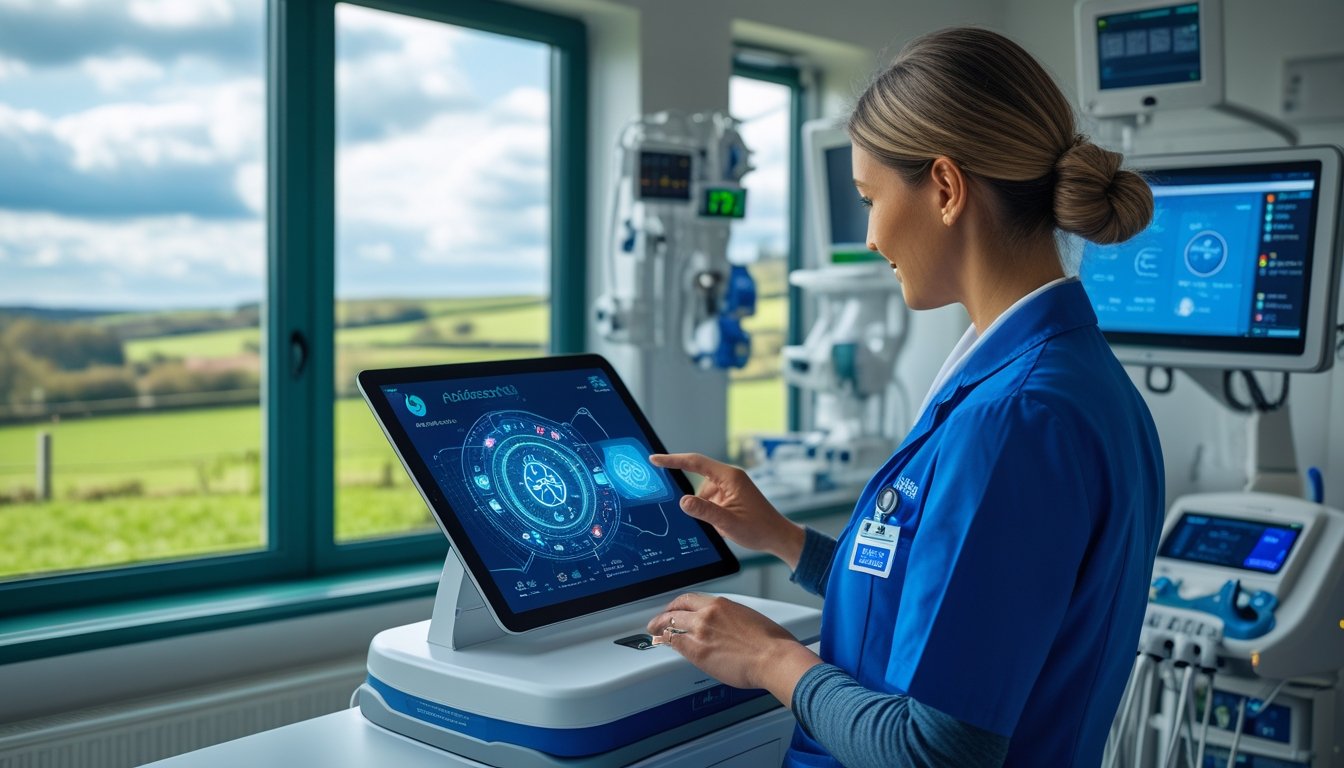Late updated: 21 Jun 2025 13:06
Written by: Oliver Bennett
AI Advancements in Rural UK Healthcare Solutions: Transforming Access and Efficiency
The integration of artificial intelligence into rural UK healthcare solutions presents a significant leap forward in bridging the healthcare divide. By employing AI, we're not only upgrading how health services operate but are also aligning innovative tech solutions with the needs of underserved rural populations. AI is revolutionising rural healthcare through enhanced diagnostics, efficient resource allocation, and more inclusive digital access. This transformation is set to empower communities that have traditionally struggled with healthcare accessibility.

As AI continues to make impacts, it brings promising possibilities in healthcare practices, including early disease detection and management. These advancements help address the critical shortage of healthcare providers by leveraging AI to support decision-making and extend the capabilities of healthcare professionals. This offers a chance for rural areas to experience a level of healthcare quality more commonly found in urban settings, ensuring that medical attention is timely and effective.
This new wave of technology also highlights the need for robust digital infrastructure and connectivity. Without adequate investment and strategic planning, the benefits of AI in healthcare could remain out of reach for these communities. Equipping rural areas with the necessary technological frameworks ensures everyone can access the lifesaving potential of AI advancements.
Key Takeaways
- AI improves rural healthcare access and diagnostics.
- Enhanced connectivity is crucial for effective AI implementation.
- AI supports healthcare professionals in underserved areas.
Transforming Rural UK Healthcare With AI Technologies

AI technologies are revolutionising healthcare delivery in rural UK settings by enhancing access and efficiency. These advancements are aiding in patient care, resource management, and remote monitoring, ultimately leading to improved health outcomes and operational efficiencies.
Integrating Artificial Intelligence Into Patient Care
AI in healthcare is transforming patient care by employing AI algorithms and predictive analytics to improve diagnosis accuracy and care personalisation. In rural UK areas, this innovation ensures patients receive timely and precise healthcare services. Our use of machine learning algorithms can analyse health data to predict patient outcomes, thus allowing healthcare providers to make informed decisions and offer bespoke treatments to patients, which is crucial in under-resourced settings.
The integration of AI-driven diagnostics reduces the need for specialist consultations, which are often scarce in rural settings. In addition to diagnostics, these technologies can streamline patient records through electronic health records (EHR), facilitating enhanced patient data management and improving coordination across healthcare teams. This integration is pivotal in the context of limited healthcare access in rural regions.
Healthcare Delivery and Efficiency Improvements
AI technologies are pivotal in augmenting the delivery of healthcare services and improving operational efficiencies. We can optimise resource allocation and scheduling through AI applications, addressing the challenges of limited healthcare professionals in rural UK regions. This is done by identifying patterns in healthcare delivery and enabling more effective use of resources.
The NHS can benefit significantly from AI-enabled systems that provide enhanced telehealth platforms for patient consultations, reducing travel barriers to healthcare access. These platforms use AI to facilitate virtual consultations, making healthcare more accessible and reducing wait times for patients. Such efficiencies in healthcare delivery are critical as they reduce the burden on existing services while improving patient experiences.
Advancements In Remote Monitoring and Smart Solutions
AI and smart technology play a crucial role in remote monitoring, significantly impacting healthcare delivery in rural settings. Utilising IoT sensors, we can continuously monitor patient health data, providing real-time insights to healthcare providers. This allows for early intervention, which is particularly important for managing chronic conditions prevalent in rural areas.
AI-driven technologies in remote monitoring span various applications, from wearable devices to robotic assistance, offering comprehensive support solutions. This approach enhances patient safety and reduces the need for frequent hospital visits. Environmental monitoring through AI also aids in understanding broader health impacts, paving the way for proactive community health management.
Role of Private Sector, Governance, and Strategic Planning
Effective deployment of AI in rural healthcare necessitates collaboration between the private sector, local authorities, and government bodies. Strategic planning and investment from these entities are key to driving AI innovation in the healthcare system. By partnering with technology firms, we can ensure that AI models and solutions are tailored to meet the unique needs of rural healthcare settings.
Government initiatives incentivising AI adoption can support the scaling of AI technologies and their integration into existing healthcare frameworks. The alignment of policy, governance, and private sector efforts ensures sustainable implementation and maximised impact on the healthcare system, especially in underserved rural communities.
Building Infrastructure and Connectivity for Rural AI Healthcare Solutions

Bridging the gap in digital infrastructure is critical for enhancing AI-driven healthcare in rural UK regions. Developments in broadband, service delivery tech, and digital training are paramount for elevating healthcare opportunities and ensuring equitable access.
Enhancing Broadband and Digital Inclusivity
To enable AI healthcare solutions, expanding broadband access is essential. Project Gigabit aims to provide gigabit-capable broadband to the most isolated areas. The Shared Rural Network initiative further ensures that mobile network infrastructure reaches remote communities, reducing the digital divide.
Without robust connectivity, rural areas struggle to benefit from digital transformation. By prioritising broadband accessibility, we ensure that these communities have the technology needed for remote healthcare services, thus promoting digital inclusivity.
Supporting Rural Service Delivery Through Technology
Technology can elevate healthcare delivery by using AI to allow healthcare providers to connect with remote patients effectively. Rural connectivity improvements ensure that AI solutions for precision farming and environmental monitoring also extend to healthcare.
Leveraging smart transportation systems can help overcome geographical barriers, making healthcare access easier. Moreover, such advancements can accelerate economic growth by supporting flourishing rural businesses, creating an environment where healthcare technologies thrive alongside other innovations.
Improving Digital Literacy and Medical Training
A crucial step in harnessing AI for healthcare is improving digital literacy among both patients and healthcare providers. Training initiatives focus on empowering medical staff with the skills to operate emerging AI tools, ensuring efficient service delivery.
By providing comprehensive medical training programs, we address the shortage of skilled professionals capable of using digital tools. These programs aim to familiarise healthcare workers with new technologies, enhancing their ability to provide quality care no matter the location. Additionally, patient education can lead to improved outcomes by encouraging active participation in their healthcare journey.
Frequently Asked Questions

Artificial intelligence (AI) is playing a transformative role in enhancing rural healthcare in the UK. By addressing issues such as limited resources, geographical isolation, and healthcare professional shortages, AI is facilitating better access and outcomes for rural communities.
How can AI technology improve diagnostic accuracy in rural healthcare settings?
AI systems can analyse large datasets to identify patterns not apparent to human practitioners. Machine learning algorithms help in interpreting medical images, such as X-rays and MRIs, improving diagnostic precision. This technology supports rural healthcare providers in making timely, accurate diagnoses, which is especially valuable in resource-limited settings.
What are the cost implications of implementing AI-based healthcare solutions in rural areas?
While the initial setup of AI systems can be expensive, the long-term benefits often outweigh these costs. AI can optimise resource use and reduce the need for specialised staff, leading to cost savings. It may also lower the overall healthcare expenditure through early diagnosis and efficient management of chronic illnesses.
In what ways can artificial intelligence contribute to the management of chronic diseases in rural communities?
AI can monitor patient data in real-time, providing insights into disease progression. Predictive analytics can inform personalised treatment plans, helping manage chronic conditions effectively. Remote monitoring tools powered by AI enable continuous care, minimising the need for frequent in-person consultations and supporting long-term health management.
What efforts are being made to ensure equitable access to AI healthcare innovations for rural populations?
There are concerted efforts to invest in infrastructure to support AI adoption in rural areas, such as enhancing digital connectivity. Partnerships between governments, healthcare institutions, and technology providers are crucial. These efforts aim to reduce disparities, ensuring rural populations gain access to the same innovative solutions as urban counterparts.
How does AI assist in overcoming the challenges of limited healthcare professionals in rural regions?
AI can fill gaps in areas with a shortage of healthcare professionals. Virtual health assistants and telemedicine platforms extend the reach of existing staff. These tools offer preliminary assessments and guidance, allowing professionals to focus on complex cases and improving overall patient care efficiency.
What are the ethical considerations surrounding the use of AI in delivering healthcare to remote areas?
Privacy concerns and data security are significant ethical issues in AI deployment. Ensuring patient data is protected is crucial. Transparency in AI decision-making processes is essential to maintain trust. Additionally, mitigating algorithmic bias is important to prevent inequities in healthcare delivery to diverse rural populations.
